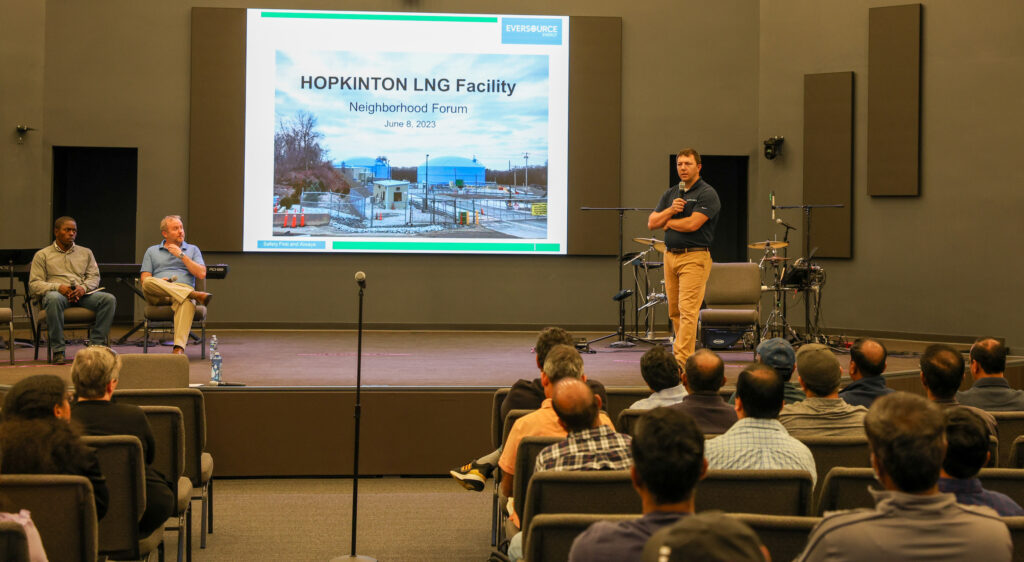
Eversource’s Jim Blackburn talks at Thursday’s public forum. PHOTO/JOHN CARDILLO
Representatives from Eversource addressed safety and operational concerns about the company’s liquefied natural gas (LNG) facility on Wilson Street at a public forum Thursday night that spanned more than three hours.
The meeting, held at the Faith Community Church on East Main Street, attracted more than 75 people, including residents of the nearby Legacy Farms community, state Rep. James Arena-DeRosa and Select Board members Muriel Kramer, Amy Ritterbusch, Shahidul Mannan and Irfan Nasrullah. It was organized in response to a request at a May Select Board meeting for a special forum to address concerns about the three aging tanks that contain a billion feet of natural gas in its vaporized state, which is condensed into a liquid of about 1/600th of that amount.
Eversource’s presentation was led by Jim Blackburn, the manager of LNG engineering and technical services. In an interview with the Hopkinton Independent on Wednesday and at the forum, he described the history of the modification work to the plant and improvements made to the liquefaction equipment that freezes the gas into a solid.
Project history detailed
“I appreciate the opportunity to get our side out,” Blackburn said Wednesday in response to concerns recently raised about safety and security at the plant. He explained that the facility is unique because two pipelines intersect there.
He said the company began in 2013 to assess its LNG assets, including its facilities in Hopkinton and Acushnet. Preliminary assessments were made of site conditions, and engineering and design work was performed “to add to the goal of safety, reliability and maintainability of the facilities.”
“Recognizing that we, as many utilities, were beginning to approach the 50-year mark of our assets, we recognized that there was a need to reinvest in the facilities to ensure continued reliability and safety,” he said.
During this time frame, Blackburn explained, the Department of Public Utilities (DPU) performed a review of the gas services agreement between the company, referred to as Hopkinton LNG Corporation, distributor NSTAR Gas, and the DPU.
“That agreement essentially provided some framework in which the company would invest in the facilities and what we would call the refurbishment period,” he said. “The idea was to modernize the facilities. The first year of that agreement was 2014.”
Now Eversource is about two-thirds of the way into the more than $300 million worth of investments into its two facilities, with most of the money going toward the Hopkinton plant. A major investment was to improve the facility’s liquefaction equipment, according to Blackburn. Eversource is finalizing the commissioning of the new equipment. The updated technology, which utilizes nitrogen to freeze the gas into a solid, will replace flammable refrigerants. This is expected to improve air quality and reduce LNG going under the roadway of Wilson Street.
Said Blackburn: “I think one of the big things that some folks in the community will see is substantial, if not total, reduction of flaring taking place at the main part of the facility, which is the hillside part that all of the folks at Legacy Farms can see.”
Some of the concerns about the project may have arisen because new residents were not familiar with the project history, he explained.
“I think that one of the things is because we’re right there on the roadway, I think people are seeing a lot of things they’re not used to seeing because maybe they’re new to the town,” said Blackburn. “It kind of draws attention to a facility that in the past was kind of quiet.”
He described LNG as “one of the keys of bridging our transformation in energy to decarbonization and moving into more electric forms of energy.” And unlike electricity, the LNG facility stores gas for use “strictly for the distribution customers” and charges them about one-tenth of the market cost during the winter months, when gas and electricity rates spike.
Said Blackburn: “At the end of the day, the LNG is really owned by the NSTAR gas customers.”
“LNG seems to be a little mysterious to folks,” he added. “They think nothing of having a propane tank for a gas grill. But LNG does not have some of the safety concerns that propane does. It’s actually lighter than air, is much safer, and is a better means of storing energy.”
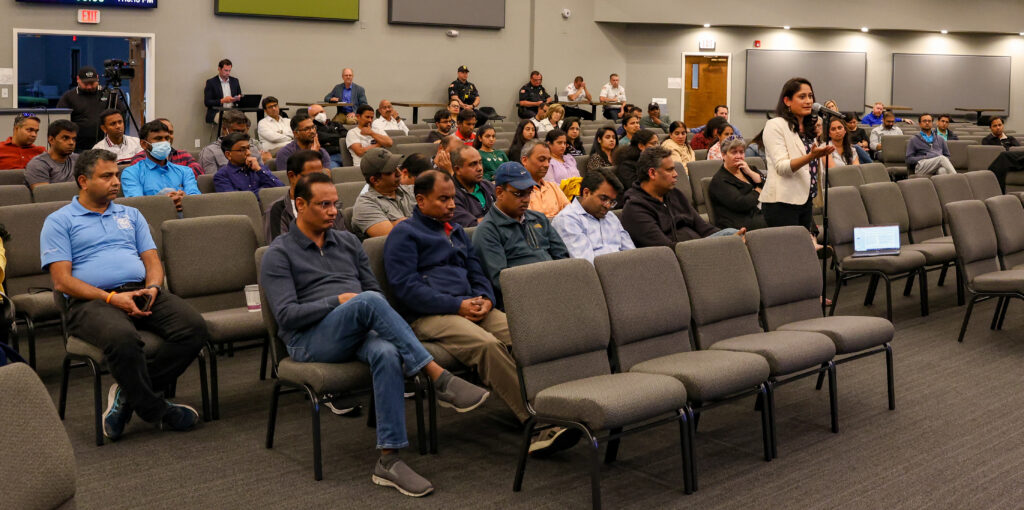
A residents asks a question during Thursday’s forum. PHOTO/JOHN CARDILLO
Residents voice concerns about safety, air quality
At the meeting, Blackburn and the Eversource team addressed concerns about safety, security and air quality. Blackburn said the plant is overseen by manager Kirk Hayden and has three supervisors, a plant superintendent, an operations supervisor and a maintenance supervisor, all of whom were in attendance.
Blackburn explained that $20 million in modernization went into examining Tank B after a “thermal anomaly” was discovered in 2017. Over the past two years, the tank was fully inspected from the inside.
What happened was that a 10-square-foot portion of the insulation made of volcanic rock between the walls of the inner and outer tanks developed some moisture and then froze. This caused it to become pearlized. The tank was taken out of service when the anomaly was discovered and then emptied, inspected and re-insulated. The tank was considered to be in good condition because LNG is not corrosive. He stressed that no cracks were found in Tank B.
Residents questioned whether the tanks are in-ground. It was explained that they are on a foundation one foot above grade level. Some confusion arose because of a report citing cracks in the rock at two antiquated tanks installed below grade; these tanks were taken out of service in the early 1970s.
Concerns were expressed about gas escaping into the air. While the facility has the ability to vent in an emergency, “generally there should be no venting of methane into the air,” according to Blackburn. The insulation and outer tank provide a buffer.
The facility has dozens of gas detection monitors that set off alarms if methane escapes, as well as fire detectors that can trigger an automatic shutdown, Hayden said. If valves are rotated, a small amount of gas may escape, but this is not considered a leak.
Security issues outside the facility also were addressed. Hayden said that security providers are outsourced. The provider was changed about five months ago because the company “was not satisfied.” The current security provider is being evaluated.
Blackburn added that there are “several layers” of internal security.
He noted that the facility is regulated by the Federal Energy Regulatory Commission (FERC), the Pipeline and Hazardous Materials Safety Administration (PHMSA) and the Massachusetts Department of Public Utilities Pipeline Safety Division. Semiannual reports are conducted.
“It is confusing because there are so many different regulators,” Arena-DeRosa said, noting that residents inquired to his office about a permit that had expired in 2017.
During the meeting, a central repository in town for documents relating to the LNG facility was suggested.
Arena-DeRosa added that he spoke with a regional director from the state’s Department of Environmental Protection (Mass DEP) regarding air quality concerns. Reports are available publicly, and Arena-DeRosa pledged to compile related reports and have them available to the public upon request.
Nasrullah, who formerly worked for Mass DEP as its senior regional counsel, explained that the operating permit regarding air quality relates to the emissions from the equipment, not from the entire facility.
Blackburn said that the renewal permit was applied for within the six-month window of expiration, keeping the plant in compliance, but Mass DEP has been very slow to issue it.
Residents also stressed their need for an evacuation plan should an emergency occur. Eversource has developed an evacuation plan with the town’s public safety officials. The Fire Department is responsible for the evacuation plan outside of the plant.
Fire Chief Bill Miller explained that situations like this are “dynamic,” and the strategy is determined by the nature of the event. Because of this, a definitive plan cannot be released to the public, he said. An evacuation plan is being updated, which occurs on a five-year basis. Reverse 911 calls and door-knocking would be performed in worst-case scenarios.
Blackburn said that May’s drill was successful and took a year to coordinate. In addition to this, “tabletop and functional exercises” are performed annually.
Security lanterns around the perimeter of the facility also concerned Legacy Farms residents. Blackburn said that the lanterns have not been working “almost from day one.” He said they were “not an appropriate measure to put in place” because igniting the gas and then sending it back toward the facility would not be safe.
Residents also asked about the need for seismic tests. The team said that there has not been an earthquake in the area of the plant or any changes in the surface around it.
Said Blackburn: “We’ll have to discuss that internally.”
Improving communication and transparency was a mutual goal of the community and residents. Residents requested that the town provide regular updates to the public on the facility.
“We’ve recognized over the last few years the sensitivity that the town has over the facility,” Blackburn stressed, noting that Eversource provides the town with weekly construction updates. “We have a much-improved relationship with the Fire Department and first responders.”



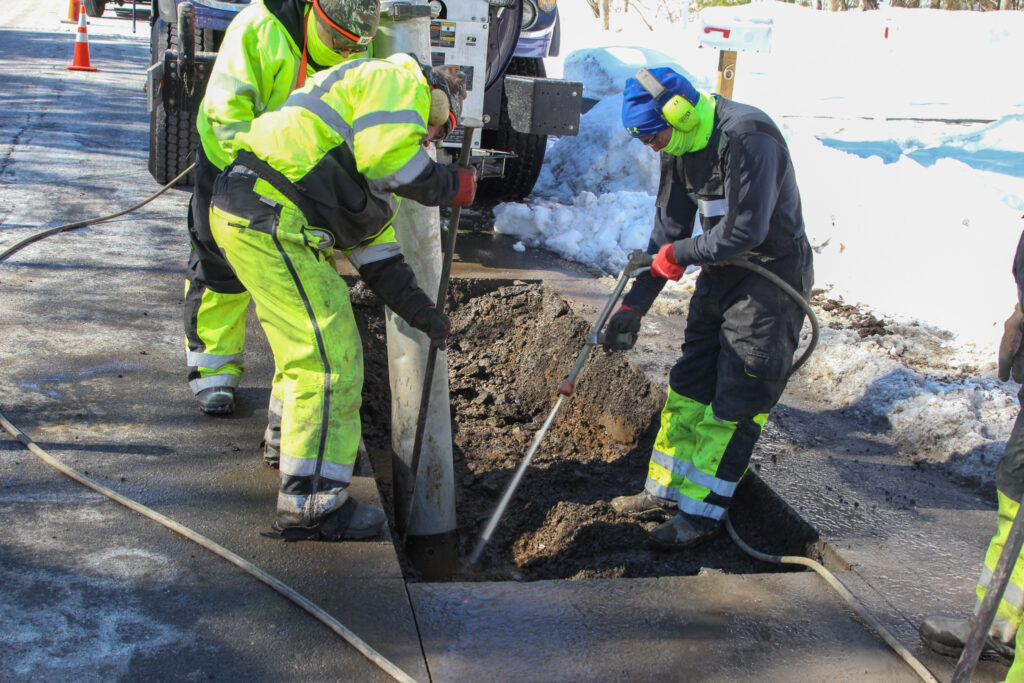


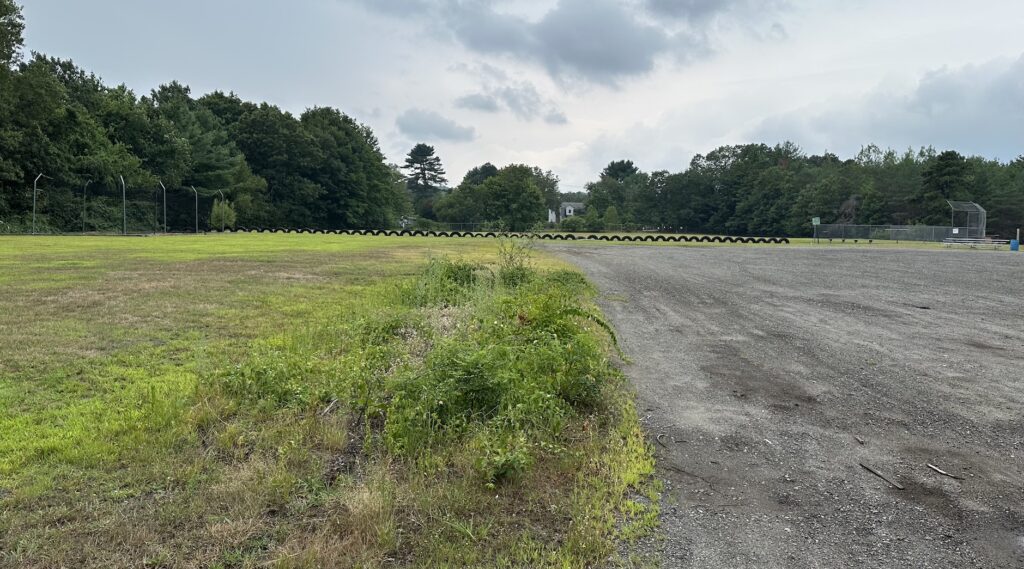
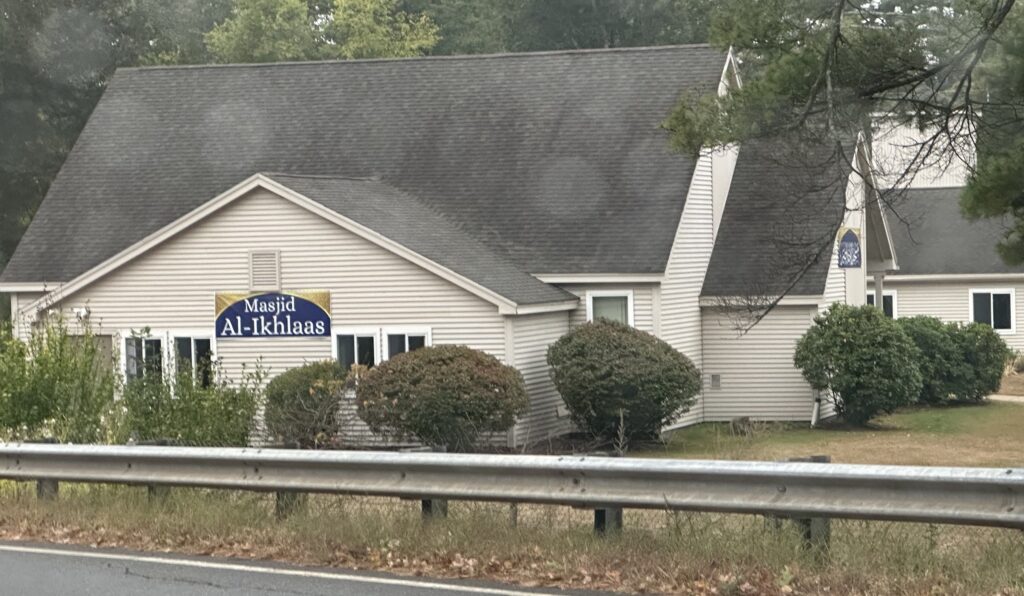













0 Comments